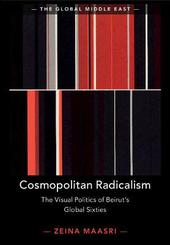
|
Cosmopolitan Radicalism: The Visual Politics of Beirut's Global Sixties
Paperback / softback
Main Details
| Title |
Cosmopolitan Radicalism: The Visual Politics of Beirut's Global Sixties
|
| Authors and Contributors |
By (author) Zeina Maasri
|
| Series | The Global Middle East |
|---|
| Physical Properties |
| Format:Paperback / softback | | Pages:343 | | Dimensions(mm): Height 243,Width 169 |
|
| ISBN/Barcode |
9781108720830
|
| Classifications | Dewey:701.03 |
|---|
| Audience | | Professional & Vocational | |
|---|
| Illustrations |
Worked examples or Exercises; 40 Plates, color; 39 Halftones, black and white
|
|
Publishing Details |
| Publisher |
Cambridge University Press
|
| Imprint |
Cambridge University Press
|
| Publication Date |
16 June 2022 |
| Publication Country |
United Kingdom
|
Description
Exploring the intersections of visual culture, design and politics in Beirut from the late 1950s to the mid-1970s, this compelling interdisciplinary study critically examines a global conjuncture in Lebanon's history, marked by anticolonial struggle and complicated by a Cold War order. Against a celebratory reminiscence of the 'golden years', Beirut's long 1960s is conceived of as a liminal juncture, an anxious time and space when the city held out promises at once politically radical and radically cosmopolitan. Zeina Maasri examines the transnational circuits that animated Arab modernist pursuits, shedding light on key cultural transformations that saw Beirut develop as a Mediterranean site of tourism and leisure, a nexus between modern art and pan-Arab publishing and, through the rise of the Palestinian Resistance, a node in revolutionary anti-imperialism. Drawing on uncharted archives of printed media this book expands the scope of historical analysis of the postcolonial Arab East.
Author Biography
Zeina Maasri is a Senior Lecturer at the University of Brighton and a former faculty member at the American University of Beirut. Her work is concerned with the histories and politics of visual culture and design in the modern Middle East. She is the author of Off the Wall: Political Posters of the Lebanese Civil War (2009) and the curator of related exhibitions and online archival resources. She is also the co-editor of Mapping Sitting: On Portraiture and Photography (2002).
Reviews'Maasri's account of the changing landscape of visual culture in 1960s Beirut provides immense insight into a critical moment in the shifting local, regional, and global dynamics animating post-colonial Lebanon. She challenges exceptionalist and teleological narratives while offering a historically grounded and analytically rigorous account of that period and its legacies.' Ziad M. Abu-Rish, Ohio University 'This fascinating and absorbing book tells the story of how visual political materials was produced in 1960s Beirut, then an international node in Third Worldist and anti-imperialist movements. What makes Maasri's narrative stand out is its focus not only on the visual scaffolding of transnational solidarity but also on material published by the state, tourism organisations and CIA-funded cultural bodies. This compelling account illuminates the role of both publishing and visual materials in the working of political ideologies and movements.' Laleh Khalili, Queen Mary University of London 'In snappy prose, Zeina Maasri decenters both nationalist and Eurocentrist readings of book cultures beyond the West to reveal the vibrant panoply of mobile, political, aesthetic engagements in page lay-outs, cover designs, and color choices. Vividly describing a previously undocumented translocal visuality, Maasri extends the work of art historians who ask what pictures want, of anthropologists who probe materiality in the formation of affective horizons, and of social scientists who study globalization from below. Even people who do not yet know they are interested in the arts should read Maasri's lucid, nuanced study.' Kirsten Scheid, American University of Beirut 'Maasri's book unearths reams of archival and printed material, suggesting that these changes occurred at a moment of generative aesthetic and political tension in Beirut, when a Western modernism brushed up against a pan-Arab nationalism ... Running through Maasri's chapters is an attempt to decenter both 'the West' and 'the nation' in an evaluation of the period's visual culture - and in doing so, complicate the conventional understanding of this Arabic Modernism that saw Beirut as its capital.' Kaleem Hawa, Artforum
|